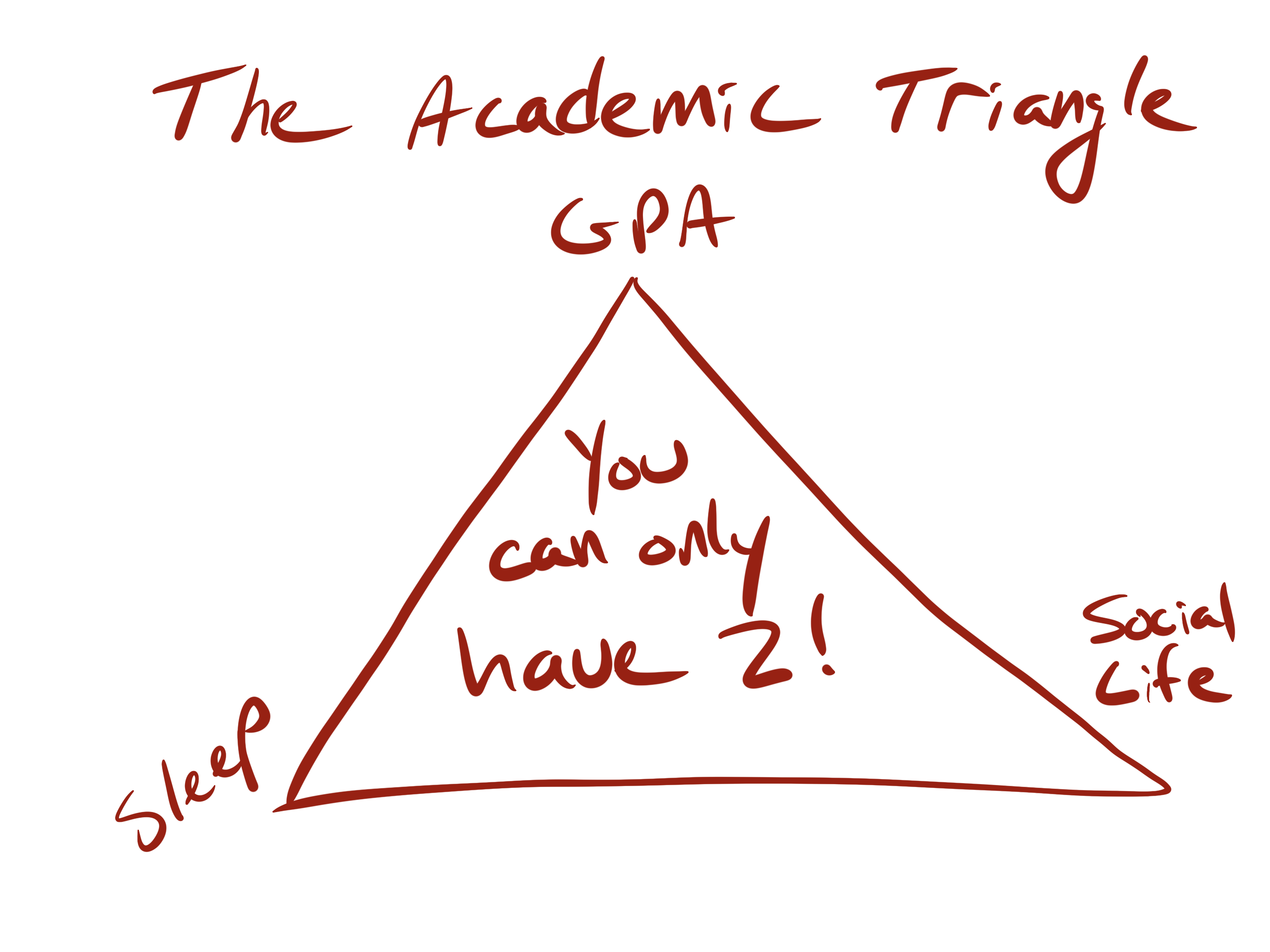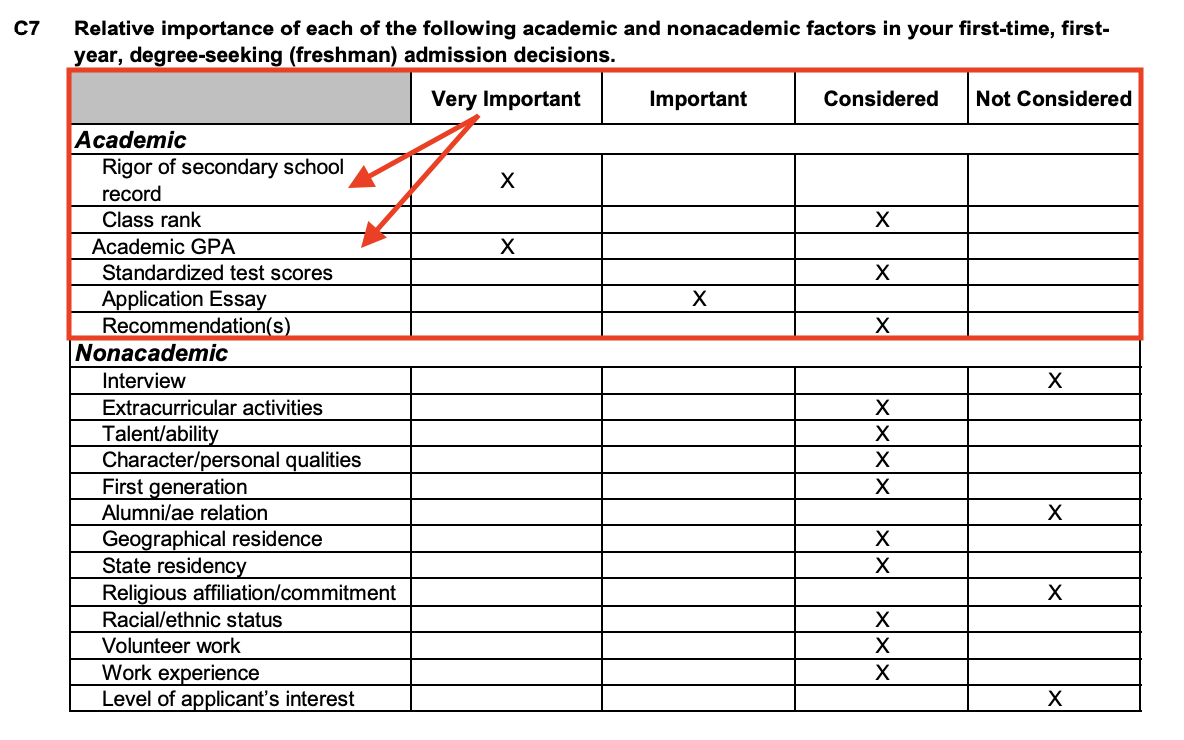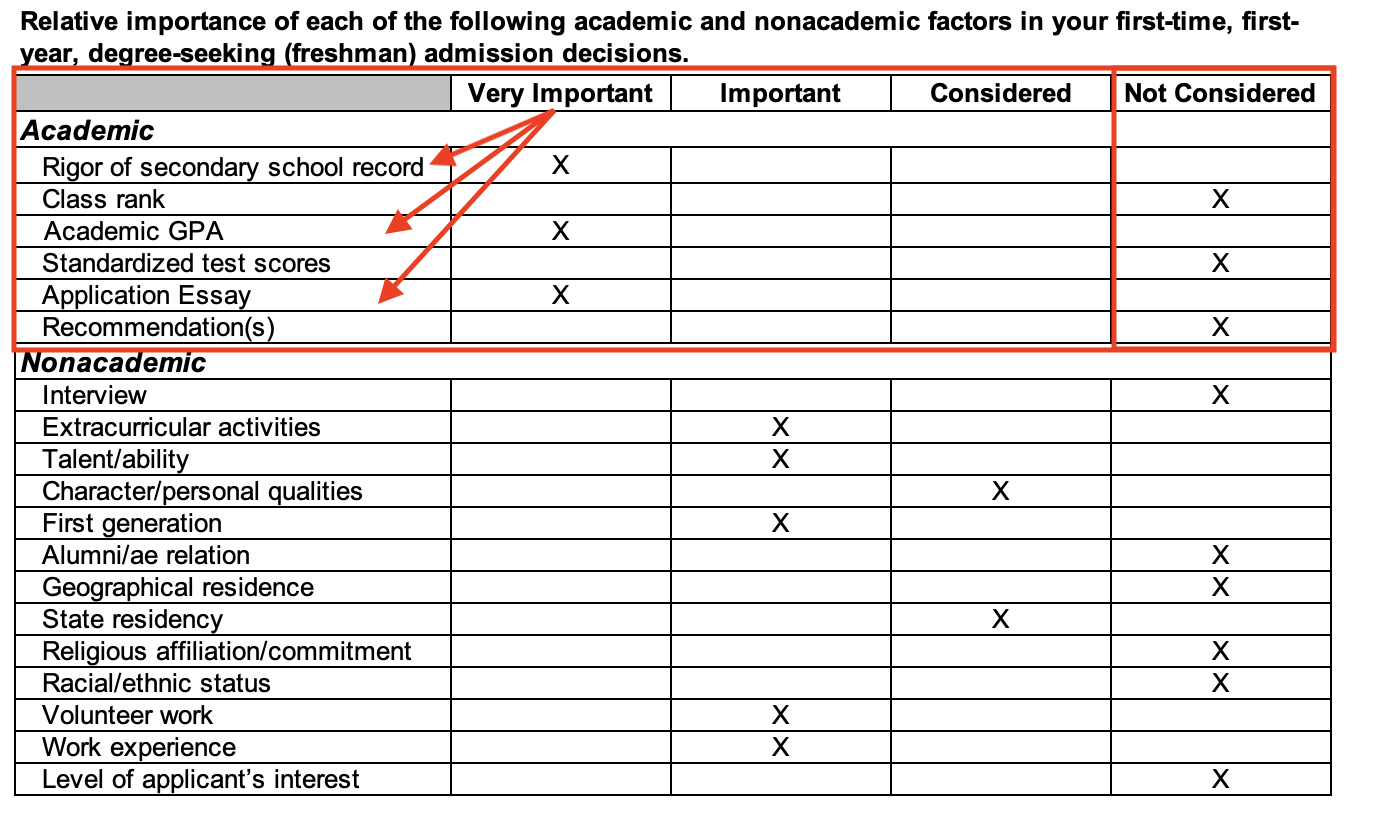How to Balance High School Grades and Academic Challenge

You want your child to take challenging courses, get good grades, and go to the college of their dreams. But you do not want your child to take too many rigorous classes, become discouraged, or even fail, and eventually get denied admission.
It's difficult to figure out which courses your child should take during high school, especially because admission requirements for college are always changing.
To find a balance between GPA and academic challenge, you need to choose a combination of courses that meet all the colleges' requirements.
To do that, you will need to make your own L.U.C.K.
L.U.C.K. - The Formula for High School Success
When selecting classes for high school, you will benefit if you make your own L.U.C.K.:
L - Learn What Colleges Want From Prospective Students
U -Understand What Courses Your High School Offers and the Demands of Each Course
C - Compare Different Course Options and Chart Your Path Through 12th-grade
K - Know Your Limits
Let's take each one of these concepts in order to understand how to balance your academic challenge and why this is so important.
L - Learn What Colleges Want From Prospective Students
Path to College: 2-Year & 4-Year Colleges
There are two main types of colleges: 2-year and 4-year colleges. To figure out which system is best for you, you must first understand what each category of school offers and how to pick the best one for you.
2-Year Junior College
Junior colleges (JCs), community colleges, or JUCOs, as the cool kids now call them, are typically two-year programs that offer associate degrees.
A junior college is a helpful option for students who aren't sure if they will pursue a degree or career. This gives students a new opportunity to both make meaningful connections and figure out what they truly want to do with themselves.
JCs are also an important option for students who entered high school with high expectations but who are struggling to fulfill them. A student who didn't do well in high school might have a difficult time adjusting to college classes. In this situation, junior college might be a worthwhile option.
In addition, 4-year colleges often have direct transfer agreements with junior colleges. For example, in California, community colleges have a direct transfer agreement with CSUs (Associate Degree for Transfer - ADT) and UCs (Transfer Admission Guarantee -TAG).
These are excellent programs that allow many deserving students to attend a four-year college and earn a degree.
What's Wrong With the 2-year College System
It is undeniable that transfer programs are effective. However, a lot is going wrong in our 2-year college system. Take a look at these stats:
2-Year Graduation Rates
• only 5% of JC students graduate in 2 years
• only 22% of JC students graduate in 3 years
• only 28% of JC students graduate in 4 years
• 70% of all students fail to graduate or transfer.
Read that one again - 70% fail to graduate or transfer!
Although a wonderful choice for some, poor graduation and transfer rates are why JCs should not be your first choice.
4-year Colleges & Universities
Entering this system is more difficult, involves much higher costs, and requires better planning. To understand this system, we must understand its requirements.
What Do Colleges Want
While all colleges have slightly different requirements, the College Board (makers of SAT) conducted a survey of colleges and found that colleges ranked six factors as "very important or important:"
• School Achievement - 89% (GPA & Course rigor)
• Test Scores - 85% (this is a pre-COVID stat. Do not be surprised if test scores slowly come back).
• Recommendations - 48%
• Essay - 43%
• Interview - 31%
• Activities - 30%
Performance in challenging classes is the best indicator of your college readiness. The more difficult the courses you can take, the better. This is not only the best way to prepare for college, but also to show colleges that you are ambitious and dedicated.
But, a demanding schedule comes at a cost. What happens when you try to do too much? You most likely will suffer from a:
-
loss of sleep
-
loss of social life
-
undue stress & other mental health issues
-
low grades (trying to do too much can cause an academic meltdown)
As with most things in life, there is a balance and you need to decide how to achieve that (more on this later).

Admissions Factors
Many colleges take into account a wide variety of factors when considering applications from incoming students. Here are some common ones:
School Achievement
How your grade point average is measured varies by college. Some schools consider grades from 9th grade on, while other schools consider only 10th and 11th grades. All grades and classes are included on the transcript, and it is generally accepted that colleges want to see how you are progressing semester by semester and year by year.
AP and Honor's courses are "weighted" because they require much more work than regular courses, so you can end up with a grade point average well above 4.0. However, not all colleges take this into account when calculating your GPA.
The University of Washington, for example, only calculates grade point average on a 4.0 scale. UW does take into account students who have taken rigorous courses, so all is not lost.
Test Scores
In the past, standardized test scores were a major factor used to determine if a student was ready for college. Today, some students apply for admission without test scores - a practice known as test-blind, while other schools consider scores if they are helpful for admission - known as test-optional.
While these tests are no longer as popular, students should still consider taking them, at least as a diagnostic test to determine their skills in critical reading, grammar, and mathematical reasoning.
If you have a student who can not handle the pace and feels overwhelmed by a timed test, give them the untimed test. When we use this test as a diagnostic test to assess ability, time should not be an issue.
Recommendation, Essay, Interviews, & Activities
While these are still important aspects of the college application process, these topics will be the subject of a future Future Proof Kids Guidebook.
Different Colleges Want Different Things
Different colleges have different expectations from their applicants. Fortunately, the colleges publish their admissions requirements and data each year in something called the Common Data Set.
The Common Data Set
The Common Data Set (CDS), among other things, lists student data for the college. The CDS provides stats for each college:
-
GPA
-
Class rank
-
Admissions criteria
-
Scholarships and aid
-
ACT & SAT test scores
When searching for colleges, the Common Data Set is an important piece of the puzzle that helps you determine if you're a match. Although the document is 30+ pages long, we want to focus only on Section C7, the Basis for Selection, to see if you fit in.
Section C7 defines the "relative importance" of academic and non-academic factors in making admissions decisions for first-year students. In other words, what colleges want from their applicants.
One of the terms that colleges have agreed upon is the concept of "rigor of secondary record." For the colleges, rigor means how demanding your schedule was each year.
Let's take a look at the University of Oregon. Note that Oregon ranks "rigor of secondary record" and academic GPA as "very important" and application essays as "important." Everything else is either considered or not considered.
The University of Oregon Basis for Selection

Now let's take a look at the University of Washington. Did you notice that rigor, GPA, and the application essay are all "very important" but nothing else academic related is?
The University of Washington Basis for Selection

Why Is This Important
Knowing the requirements for each college can help students decide what level of rigor they want to pursue in college and what classes they should start taking now.
To improve your chances of admission, you need to present a strong application that includes your GPA, possibly test scores, recommendations, essays, and activities.
U - Understand What Courses Your High School Offers and the Demands of Each Class
Schools differ in their course offerings, but there are some general rules that high schools must follow.
Colleges Lead With the Requirements and High Schools Follow
Most colleges require you to complete a certain number of courses in specific subject categories. The University of California has a simple format for undergraduates to follow, and if you follow it you should be able to apply to schools like UCLA and UC Berkeley. These requirements are very similar for state systems and private colleges.
Subject Requirements (A-G)
Meeting minimum requirements for admissions to programs typically requires the completion of at least 10+ high school courses prior to your last year of high school.
High school diplomas aren't the only path toward a college degree. Many colleges accept college courses, AP exams, and some military credits as credits toward degree requirements.
Categories of Classes
-
A - History (2 Years)
-
B - English (4 Years)
-
C - Mathematics (3 Years)
-
D - Science (2 Years)
-
E - Foreign Language (2 Years)
-
F - Visual & Performing Arts (1 Year)
-
G - College Prep Elective (1 Year)
Let's take a look at some of the classes offered and the demands of the classes.
A - History (Two Years Required, Three Years Recommended)
While colleges will say only 2 years is required, the more competitive colleges will want more.
Many schools will have a World History or World Cultures course in 9th or 10th grade, followed by US History in 11th, and then Government in 12th grade (this is often a requirement for graduation).
Some schools will add an Ethnic Studies course, which will be mandatory for all California students who graduate by 2030.
With regards to advanced history courses, AP World, AP Euro, and AP US History (APUSH) all follow a similar format in terms of the amount of reading, note-taking, and questions asked (multiple-choice, short answer, document-based questions, and long essays).
APUSH seems to ask more specific questions, with many feeling it is the most challenging of the courses (it has the lowest AP pass rate of all AP History courses).
The skills taught in these courses are invaluable for college-bound students. These courses are reading & information management courses and the skills learned will serve you well in your future academic life.
B – English (Four Years Required)
9th Grade
If you are a college-bound student and there is an honors option, you may want to consider this class. While it is additional work, the value is getting additional writing and grammar before 10th grade English & history classes.
10th Grade
If you took an advanced class as a 9th grader and it went reasonably well, then you will want to take an advanced course in 10th grade. Setting yourself up for future success really begins in this class.
Grammar, challenging reading, and essay writing are usually the core elements of a 10th-grade English class. This is a gateway course to future English and history courses, so you want to make success in this class a priority.
11th Grade
While there might be an honor class option here, many college-bound students will opt for AP Language and Composition. This course is focused on the “elements of argument and composition as you develop your critical reading and writing skills."
Success in this class will help determine your level of readiness for college.
12th Grade
Things tend to change a bit once students get to 12th grade. Like all years, there is a regular English class that helps students meet the requirement of 4 years of English.
For the hardcore college-bound students, AP Literature and Composition is your class. In this class, you will “learn how to understand and evaluate works of fiction, poetry, and drama from various periods and cultures. You’ll read literary works and write essays to explain and support your analysis of them.”
The syllabus has 3 main topics & each topic has 3 units:
· Poetry
· Short fiction
· Long fiction or Drama
If you have a strong aversion to one of these topics, this is not the course for you! Many college-bound students who are good but not great in English bypass this course. However, if you eventually want to receive a Humanities degree, this course is a must.
Students who take a number of advanced English and history classes through high school and do well are set up for success in college.
C – Mathematics (Three Years Required, Four Years Recommended)
Math is a key subject for future STEM majors and your math path is essentially set by 6th grade. So, in a sense, your college prep began at the end of elementary school.
Don’t believe me?
The Math Path
Competitive colleges are interested in students who take at least one year of AP Calculus (better if you can squeeze in two). In order to get Calculus by 12th grade, you need to follow this path
12th – Calculus AB or BC
11th – Precalc (Honors Precalc has more trig for an easier transition to calculus)
10th – Algebra II with Trig (regular Algebra II does not cover much trig, making it less rigorous and not a great prep class for those aiming for calculus.
9th – Geometry
8th – Algebra I
7th – Pre-Algebra
6th – Regular Math
Of course, the more competitive colleges are looking for students who will do more and get great grades in challenging classes.
The misconception is that the most competitive colleges want well-rounded students. Ultra-competitive colleges want students who have maxed out every category and dedicated their lives in the pursuit of getting to the most competitive college.
While that is great for some, it just isn't attainable for many.
For competitive colleges, not ultra-competitive colleges, these schools don't need a well-rounded student. These schools are generally much more interested in a well-rounded student body, and they achieve that by getting well-lopsided students (e.g., students who are strong in math and science, or English and history).
What If I Don't Want to Take Calculus?
For those that want the math pain train to end, but still want the rigor of an AP class, you can always take AP Stats.
AP Stats is a good class if:
-
you are not going into a STEM major in college
-
you need an additional AP class but you are done with Calculus
-
you are planning on going into social science, business, healthcare, or any sort of research
AP Statistics can be challenging at first because it will be very different from the algebraic math you have been studying for the last several years. Like most things, there is a steep learning curve initially, so make certain you stay focused on this class in the first semester.
D- Science (Two Years Required, Three Years Recommended)
Science classes allow for more freedom with your path, but, there are a few things to consider when selecting these classes.
9th Grade
Biology, Earth Science, and basic physics are common offerings in 9th grade. These classes are more reading and information management classes that usually do not involve challenging math.
Study skills and reading skills will be more important to do well in these classes than anything else.
10th Grade
Chemistry and Honors Chemistry are often taught in 10th grade. The difficulty level ramps up considerably going from regular Biology to Honors Chem. This is also a reading and information management class, but there will be more challenging math and concepts in the honors version.
While other classes are taught, chem is the traditional 10th-grade jumping-off point for a glimpse into the STEM world.
11th & 12th Grade
High school STEM courses have two paths: chemistry and physics which involve more math, and AP Bio and AP Environmental Science which are science courses but utilize critical reading skills, note-taking, and managing large amounts of information.
For students who took (and enjoyed) Chemistry Honors, this is a good year to continue down the chem path with AP Chemistry. Now, if you didn't like Chem Honors, you definitely won't like AP Chem! But, if you found chemistry interesting and enjoyed it, it makes sense to continue so you can capitalize on the existing chemistry knowledge you have.
If chem doesn't interest you, then you can take a look at AP Bio, AP Physics, or AP Environmental Science (APES). My recommendation is to save AP Physics until you have completed Precalc, preferably calculus.
Most likely, you have taken enough math to do well in AP Physics, but there is a problem-solving maturity that happens as you get older and you only get that by taking more advanced math.
AP Bio and AP Environmental Science are information management courses. Yes, they are science courses, but the skills required to do well in these courses are closer to what you learned in AP World History and AP US History.
The textbooks are HUGE, sometimes over 1,000 pages. The only way to succeed in these courses is to be a good reader, a great note-taker, and a student who can manage information.
E- Language Other Than English (Two Years Required, Three Years Recommended)
Romance Languages are most often taught in US high schools, with Spanish taught at 46% of schools, and French being taught at 21% of schools. Chinese, German, Latin, and American Sign Language are offered at less than 5% of schools.
1st-year foreign language (romance-based) classes primarily focus on vocabulary and basic verb conjugation. If students focus on consistent practice, this should not be an overly challenging year.
2nd-year foreign language continues vocabulary development but also teaches more grammar and verb conjugation, usually with multiple past tenses. Students who struggle with English grammar often will struggle with this year of the foreign language.
3rd-year is the most common endpoint for most high school students. Third-year students have exceeded the minimum requirement but have come to the realization that they are not going to be fluent nor do they care to be!
4th-year students are usually in an AP level class, and the expectation is that all "business" in class is to be done in the language being studied. There are extensive translations and speaking assignments, which is often enough to scare students away.
If you are strong in the 2nd and 3rd years of the language, you should consider going to the 4th year, if:
-
have room on your schedule
-
you like what you are studying
-
plan on doing something that will require a second language.
Colleges like to see a commitment to one subject. It is better to take 4 years of the same language than it is to take two years of one language then switch to take two years of a second language.
F- Visual, Performing, and Applied Arts (One Year Required)
Visual and performing arts are classes selected from dance, music, theater, visual or interdisciplinary arts. While these are often not considered "academic" classes, some schools can offer AP History of Art, AP Art and Design, and AP Music Theory.
One way to classify these schools is as "portfolio-based." While most students will not move on to a college program requiring a portfolio, there are many great skills to be learned from these classes.
If you are not art or musically inclined, consider AP Computer Science or some sort of multimedia art class that will build computer-related skills (check with your school first). Even if you are not planning on a career in art or technology, these classes are a great way to develop valuable skills.
G- College-preparatory Elective (One Year Required)
Your elective can be from any number of different categories and if you have exceeded your course requirements, you most likely have already fulfilled this elective.
If you are just going to meet the minimum requirements for college acceptance, it makes the most sense to find a class that is not part of a sequence (e.g., AP Stats requires Precalculus, Spanish IV requires Spanish III).
If you need a class with less rigor, adding a class from the Applied Arts category that builds on a computer-related skill will fulfill this requirement. If your school offers these sorts of classes (AP Computer Science Principles and AP Computer Science A are some options), consider taking one of these classes even if you just plan to take the minimum college requirements.
C - Compare Different Course Options and Chart Your Path Through 12th-grade
You know what colleges want and what your high school offers. Now it is time to chart the perfect plan up to high school graduation.
By creating this framework, you have the ability to follow it year by year, class by class, or you can adjust as needed if you find the work is either:
-
not interesting
-
too challenging
-
your goals changed
Colleges want to see a progression from year to year.
They want to see you mature academically, which means increasing the level of rigor and success in challenging courses. Establishing the "perfect" path for you positions you for success.
But, we are all human and occasionally make mistakes. You may run into a class that you don't enjoy, a teacher you struggle to learn from, or your priorities may shift during the year.
What you can't do is start slowly then try to catch back up. You can always step down in difficulty, but getting partway through your high school career than trying to play catch up is unlikely to happen.
As you chart your path, remember it is better to have a balance of challenging courses with the best GPA you can possibly get.
Being unbalanced (i.e., too many difficult classes but having a low GPA, or, a transcript that lacks rigor but you have a 4.0), does not help your chances of getting into selective colleges.
What Does Balance Look Like
There is no perfect template for this. You will have classes you enjoy and excel at and you will have classes that are overly challenging and get by with a grade less than an A.
When designing your future class schedule, balance rigor, success (B or better), time for an activity or sport that you can do for multiple years, and leave time for a social life.
While some of the most competitive colleges focus on just grades, classes, and test scores, you risk burnout if you do not stay emotionally balanced as well.
K - Know Your Limits

The best plan is only limited by your ability to execute it.
If you are not committed to the plan you set or don't have the ability to stick to the plan, then you need to adjust.
But how do you know what you can do?
To understand your limits, look to your past:
-
Were you able to recover from a bad test or bad semester?
-
What was your emotional state when things got stressful?
-
Were you motivated to conquer the next challenge or did the struggle get the best of you?
If you struggled to pick yourself up after a setback, then maybe you should aim for less rigor and better grades. Taking one or two AP or Honors courses may be a better fit for you to build back your confidence.
If you did struggle but were able to recover and are motivated for the challenge, then you can up the level of difficulty a bit more.
If there was little difficulty with your previous year's load, and are excited about the challenge, then you can stretch yourself a bit more. Be careful when you do this. Successful students tend to increase the level of difficulty across all spectrums, not just one (i.e., rather than just taking an additional AP course, they also add in a new sport, join a club, and become more social!).
Is It Better to Have a High GPA or Take Challenging Courses?
The short answer is that it is best to have both.
But, that isn't always possible, so the second best thing is to have a balance between both. Colleges want to see that you are successful and that you challenged yourself, but they don't want students to take challenging courses without having a firm grasp of their concepts. A student who took too challenging of a course load and had an epic academic meltdown has shown they aren't ready for college (they don't want a liability on their hands).
This is why you need L.U.C.K.
The balance point can only be calculated once you know:
-
what colleges want
-
what your school offers
-
what your path will be (with options to change if things don't go right)
-
what level of commitment & what level you challenge were you capable of handling.
You must balance a challenging workload and the quality of each course you take. Luckily, there are some strategies you can use to help boost your grades in challenging classes and free up time to pursue other interests.
Stay connected with news and updates!
Join our mailing list to receive the latest news and updates from our team.
Don't worry, your information will not be shared.
We hate SPAM. We will never sell your information, for any reason.

